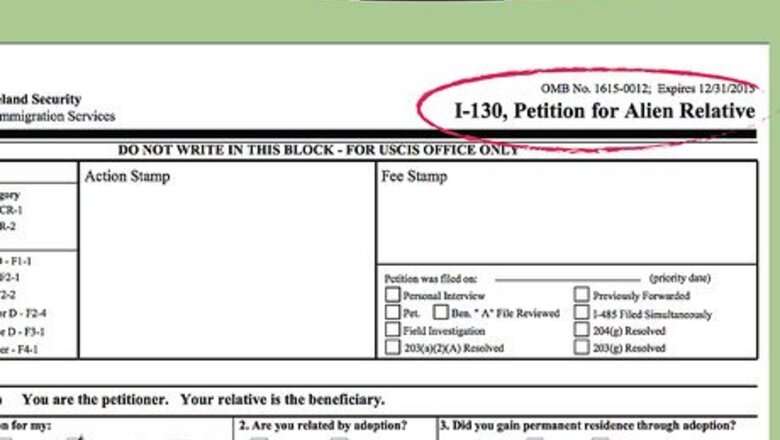
views
X
Trustworthy Source
US Citizenship and Immigration Services
U.S. government agency in charge of the naturalization and immigration systems
Go to source
In order to sponsor an immigrant, you should gather the necessary forms and other supporting documentation. This article is intended for general information only (not legal advice). If you need help, please consult with an immigration lawyer.
Sponsoring a Relative for a Green Card
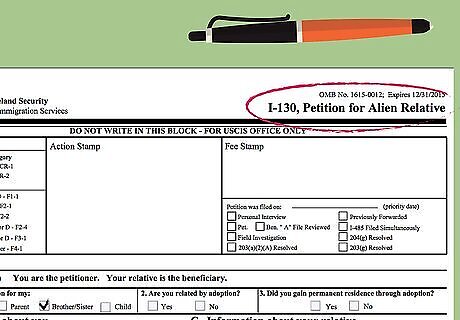
Complete Form I-130. This form is called a “Petition for Alien Relative.” You use this form to start the petition process for sponsoring a relative to move to the United States. You can download it from the United States Citizenship and Immigration Services (USCIS) website. The form will ask for the following information: personal information about you (name, address, place of birth, etc.) personal information about the relative you want to sponsor if the relative has a spouse or any children personal information about your relative’s children and/or spouse
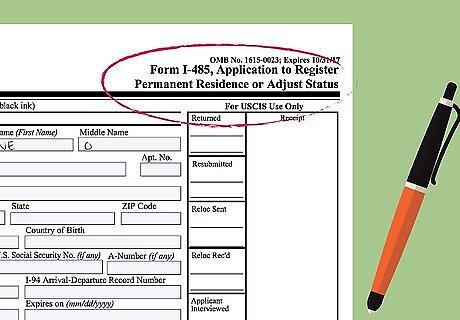
Download Form I-485. This form is called the “Application to Register Permanent Residence or Adjust Status.” The family member you want to sponsor must complete this form. He or she can get it by downloading the form from the USCIS website. You can share the link with your family member or print it out and mail it to him or her. Your relative should use this form only if they are in the United States currently. If they are not in the United States, then they can use “consular processing” instead of Form I-485. Under this process, you submit your I-130 form. Once it is approved, the petition is sent to the State Department’s National Visa Center. When an immigrant visa becomes available, your relative gathers the required materials and schedules an interview. At the interview, a consular official will help your relative fill out an application and decide eligibility at that time.
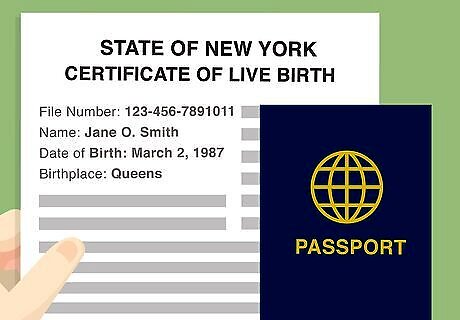
Gather documents in support of your sponsorship. In order to sponsor a family member, you need to prove that you are a U.S. citizen. You also need to show that you are related to the applicant. You should gather these documents ahead of time since you will need to include them with your application. To show that you are a U.S. citizen, you should provide a copy of your birth certificate, naturalization certificate, or unexpired U.S. passport. To prove that you are related to the family member, you will need to provide other documents. See the instructions for Form I-130 for more information about acceptable documents.

Pay the required fees. You must pay $420 when you submit your Form I-130, Petition for Alien Relative. Make your check or money order payable to “The U.S. Department of Homeland Security.” Do not use abbreviations or initials, such as “USDHS” or “DHS.” Your family member will also have to pay fees. Have them refer to the instructions for Form I-485 to calculate how much they must pay.
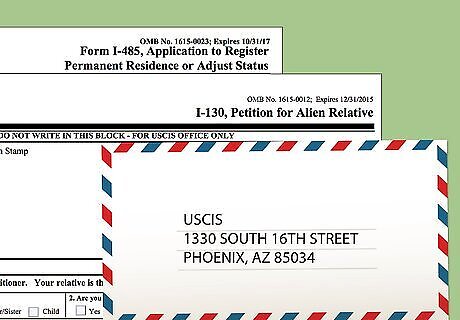
Submit your form. You will mail your form to either the Chicago or Phoenix Lockbox, depending on where you live. You can check the USCIS website for information on which Lockbox to mail your application to. If you and your relative file at the same time, you can use one envelope and mail it to the USCIS Chicago Lockbox. Once USCIS receives your petition, they will send Form I-797C to you, which will show your receipt number and the office processing the case.
Completing an Affidavit of Support
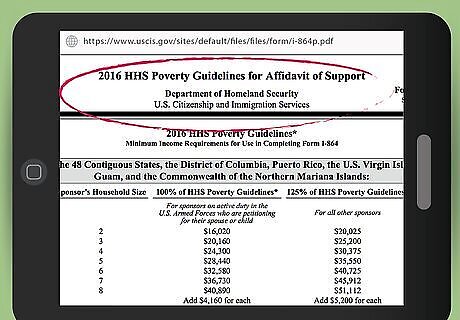
Check if you qualify to financially sponsor a relative. As part of petitioning USCIS to admit a relative into the U.S., you must also financially sponsor your relative. This means that you agree to support your family member or agree to pay back the government if the family member needs public assistance (“welfare”). In order to qualify, you need to have income and assets at 125% of the federal poverty level for a family of your size. The assets you have must be easily convertible into cash and cannot cause undue hardship. Common assets include checking accounts, stocks and bonds, and property. However, you might not be able to count a sole retirement account, since cashing that out could cause an undue hardship.
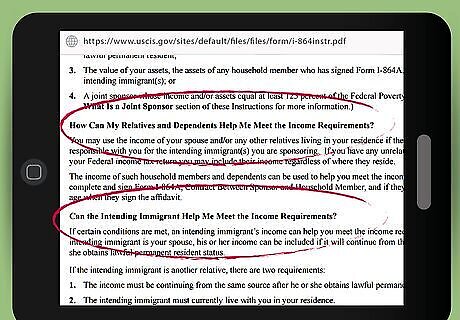
Identify supplemental sources of assets. If your total income and assets fall short of the guidelines, then you can try to supplement your income and assets to get over the 125% threshold. You can rely on the following: You can rely on the immigrant’s own income or assets. For example, if your relative is already in the U.S. and working a job, then you could count the wages if he or she will continue working the job after getting a green card. You can have another person in your household sign the petition if they also earn an income. For example, your husband could sign the petition if he has a job or gets retirement benefits. You can find a joint sponsor who also earns income. The joint sponsor does not need to be related to you or to your relative. However, the sponsor must be a U.S. citizen, lawful permanent resident, or U.S. national who is at least 18 years of age.
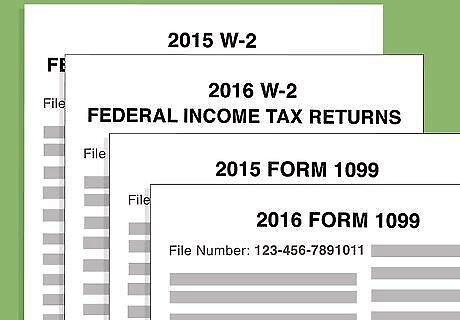
Gather financial documentation. You need to provide financial documents that show your income and other assets. You should gather the following documents: a copy of your individual Federal income tax returns (including W-2s) for the most recent tax year, but you can include income tax returns for the past three years if you think they would help you qualify a copy of each and every Form 1099 for the past year a statement explaining why you were not required to file your taxes (if you didn’t file) a copy of your Schedule C, D, E, or F for the most recent year if you are self-employed proof that the immigrant’s current employment will continue and a copy of their federal income tax returns (if you need their income to qualify) documentation of your assets that establishes their location, ownership, date you acquired them, and value other documents explained in the instructions for Form I-864
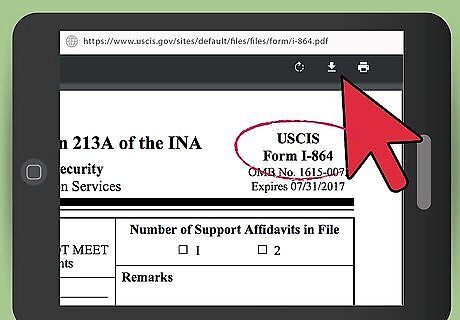
Download Form I-864. You must complete this “Affidavit of Support.” You do not submit this with your I-130. Instead, you submit it when your relative gets ready to actually immigrate. You can download the form from the USCIS website. If you need a family member to also sponsor so that you can meet the income eligibility requirements, then he or she should complete Form I-864A, “Affidavit of Support Contract Between Sponsor and Household Member.”
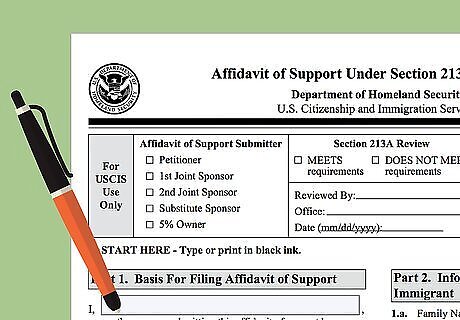
Complete Form I-864. You should type the requested information into the form or write neatly using black ink. The form will generally ask for the following information: your name information about the principal immigrant, including name, address, date of birth, and country of citizenship information about other immigrants you are sponsoring (if more than one) your mailing address and physical address the size of your household your employer and current income information about your assets information about the immigrant’s assets
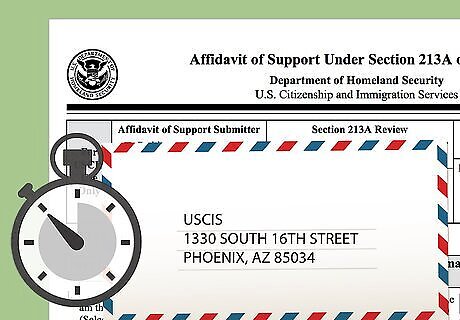
Submit the form at the appropriate time. Generally, your relative is not immediately approved to move to the U.S. Instead, he or she gets in line. Eventually, they will move up to the front of the line. At that point, their visa will start being processed, and you will submit the Affidavit to the National Visa Center. You will be also be invoiced $120 for submitting the Affidavit at that time.
Sponsoring an Employee
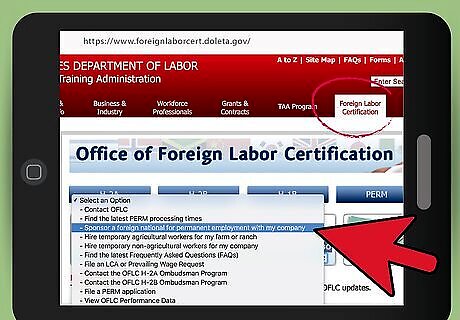
Apply for permanent labor certification. This step isn’t always required, but it might be. You should start by visiting the Department of Labor’s website. From the drop-down box, you can select “Sponsor a foreign national for permanent employment with my company.” The purpose of the certification is to make sure that hiring a foreign national won’t negatively impact the employment prospects or wages of U.S. workers. You can download the forms at the Department of Labor website. If you are trying to hire a permanent employee, then you would complete form ETA 9089.
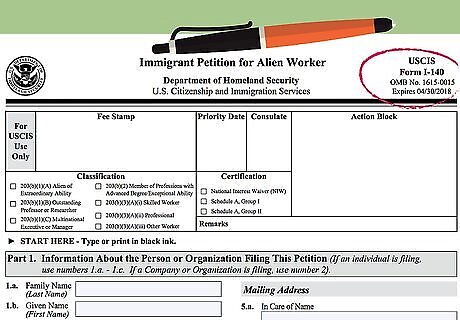
Complete Form I-140. After you are certified by the Department of Labor, you must then complete an “Immigration Petition for Alien Worker” on behalf of the foreign national you want to sponsor. You can download the form from the USCIS website. You should also download the instructions. Insert the information using a typewriter or writing legibly using black ink. Be sure to answer all questions accurately and fully. If you need additional space, then attach a piece of paper with your name on the top. Clearly indicate the Page number, Part Number, and Item Number that your answer refers to. Also, sign and date each additional sheet.

Pay the fee. A $580 filing fee is required, payable by check or money order. Make out payment to “U.S. Department of Homeland Security.” Do not abbreviate to “USDHS” or “DHS.”
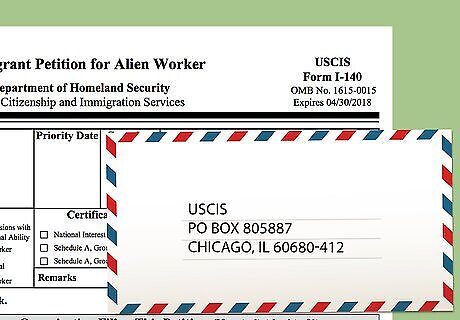
Mail the form. You can find the address where you are to mail the completed form by calling the USCIS National Customer Service Center at 1-800-375-5283. Once your Form I-140 petition is received, USCIS will send you a receipt.




















Comments
0 comment